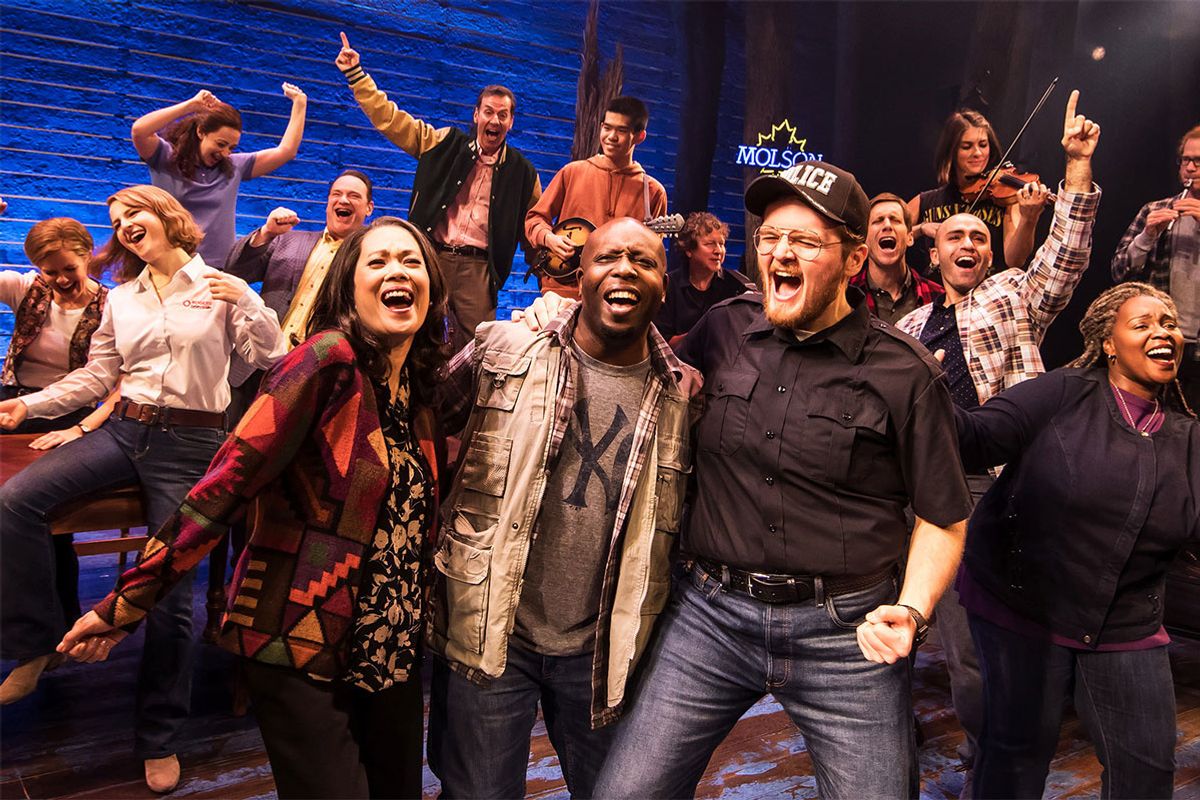On the morning of September 11, 2001, U.S. airspace was closed after the deadly attacks on the World Trade Center and the Pentagon. Thirty-eight jets flying international routes, many of them carrying 200 to 300 passengers each, were forced to make emergency landings in Gander, Newfoundland.
The small town of 9,000 or so people welcomed 7,000 guests that day, many of whom stayed four or five days without access to their luggage. The story of their arrival, and the outpouring of kindness and hospitality these derailed passengers were shown by Newfoundlanders, became a comforting coda to the larger tragedy of that horrific, historic moment.
Fast forward to 2011, and as the 10th anniversary of 9/11 approached, Canadian theater producer Michael Rubinoff approached Irene Sankoff and David Hein, a husband-and-wife writing team who had some success in Toronto with a musical called My Mother's Lesbian Jewish Wiccan Wedding (based on Hein's own experience with a mother who came out late in life). Rubinoff's initial concept led the couple to head to Gander for the anniversary, where they interviewed dozens of townspeople as well as some of the plane passengers and pilots—known to the locals as "come from aways"—who had returned for the commemoration. Those interviews formed the basis for the book and lyrics of the musical they would write, Come From Away, which was first workshopped in Ontario in 2012. By 2015 it was getting honed in runs in San Diego and Seattle, and then it opened on Broadway in March 2017, where it continues to play after earning seven Tony nominations and one win for Christopher Ashley's masterfully kinetic direction.
The touring production, which opened Wednesday at SHN's Golden Gate Theatre in San Francisco, has the same spare set (designed by Beowulf Boritt) and direction by Ashley, and the ensemble includes a dozen Broadway vets with the vocal chops and versatility to prove it.
Come From Away is a moving surprise with its lively pace, authenticity, and the uniqueness of its tale and characters—all keys to its near two-year success in New York. Then there's the buoyant, Irish-inflected music by Hein and Sankoff, beginning with the rollicking opening number "Welcome to the Rock." That song, along with multiple other ensemble numbers like "Screech In" (performed in the town bar) and the finale, are the anchors of the show as well as its melodic highlights. Also good is a mid-show solo number, "Me and the Sky," sung by Beverley (Becky Gulsvig), an American Airlines pilot and a pioneer female captain in commercial flying circles; the piece becomes a small anthem of women's empowerment, as idiosyncratic as her story is.
Most of the other songs, while enjoyable, don't rise to level of being memorable. A few feel wedged in between the quirky dialogue and intersecting stories of the many, many characters in the show—and given that many of the lyrics, like the book, hew so closely to the exact wording of the interviews, they are more akin to story-songs or recitative than they are to musical theater numbers.
Each actor plays at least three or four characters in the show, if not more, though most are identified with one particular person either from the island or from one of the planes. The vocal gymnastics they each must do, toggling between accents both foreign and domestic (and Newfoundlander), is astonishing—never mind that there are a half-dozen standbys on the tour, each of whom has to know four or five of these multi-faceted roles at once. I saw one on opening night, Marika Aubrey, in the role of "Hannah and others," and there was no sense at all that she hadn't gone on every night.
The most riveting part of the show is in its first 30 minutes, watching the frenetic preparations and hearing the stories of the Gander residents on the ground. They are navigating their own small dramas, like a local school bus driver strike, and then realizing they are about to be inundated with thousands of unhappy strangers. This is juxtaposed with the stories of those strangers, some of whom were trapped on the tarmac, in those stuffy planes, for 10 to 20 hours before being allowed to deplane.
It's a bizarre moment to be sure, and one worthy of dramatic retelling—historic not just because of the context, but because of the rarity that so many people from so many different places could be thrust together in such a difficult, communal circumstance. We are also given glimpses of very personal stories—the death of a son, a breakup, a chance meeting that leads to love—that humanize this microcosm of history.
Whether Come From Away is a great piece of musical theater is another question. This medium seems appropriate for the raw emotionality and quirky humor of the story, and I'm glad the story is being told in this way, with this level of talent behind it. But it's not a tour de force music-wise, and I think much of the show's appeal lies in the inherited power of its subject, and the deft way it pulls off telling a feel-good story about 9/11.
Eighteen years later that may be what the American public most wants: a perspective on this moment that one can bear looking at. I still walked away unable to remember much about the music beyond the opening and closing refrain, "I'm an islander, I am an islander." Had there been a few more great melodies, the history here might have had even greater resonance.
// Come From Away plays through Feb. 3 at SHN's Golden Gate Theatre, 1 Taylor St. (Tenderloin). Tickets are available at shnsf.com and rushtix.com.
This review originally appeared on Opening Night SF.





















